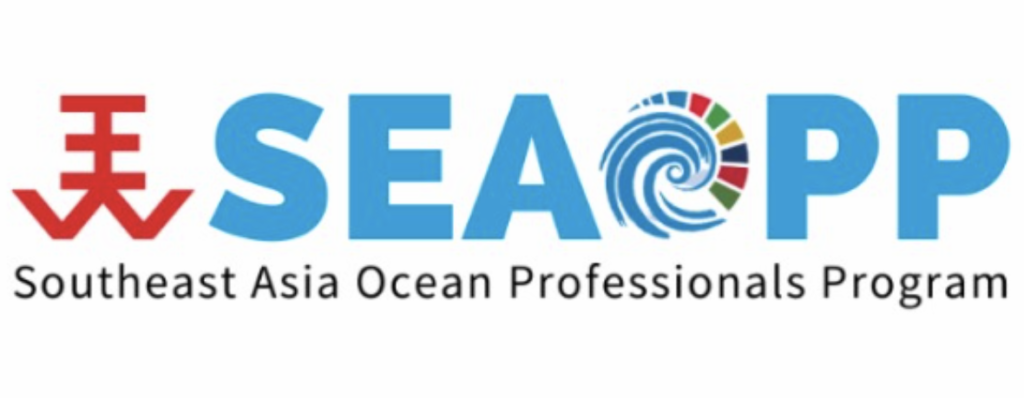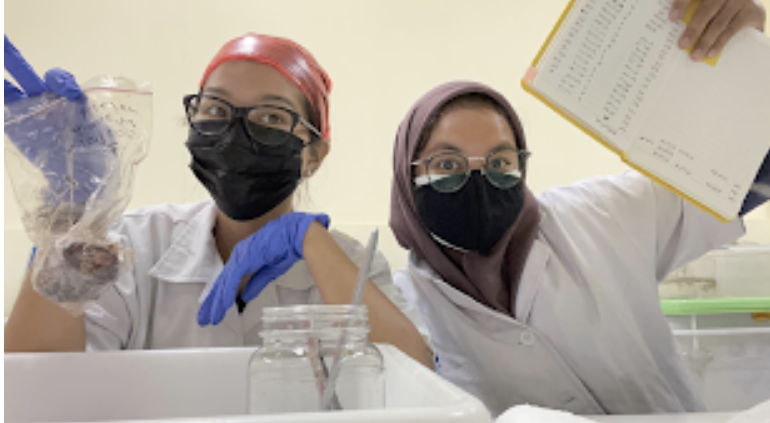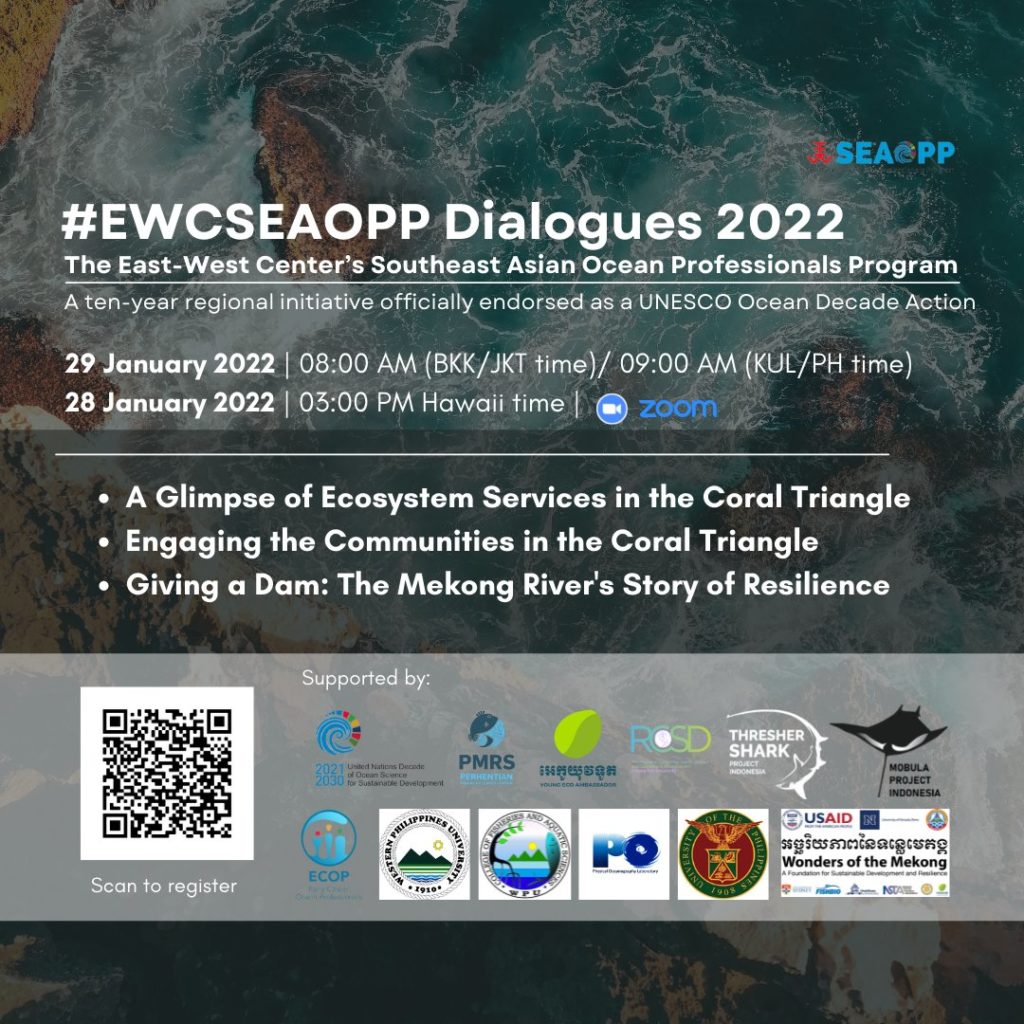The East-West Center's Southeast Asian Ocean Professionals Program (#EWCSEAOPP)
Vision and Mission
The East-West Center’s Southeast Asian Ocean Professionals Program (#EWCSEAOPP) will promote equitable, innovative, and inclusive strategies for financing and facilitating professional development for early career ocean researchers, entrepreneurs, and professionals that improves understanding of ways to utilize ocean science to improve the health and resilience of the oceans and waters of Southeast Asia, as well as recognize and celebrate successful and innovative ocean science policies, practices, and strategies across this critically important geopolitical and ecological region.

Goals and Objectives
1. Contribute to fulfilling the Ocean Decade Challenges and to achieving the 3 Decade objectives:
- Identify required knowledge for sustainable development
- Generate comprehensive knowledge and understanding of the ocean
- Increase the use of ocean knowledge
2. Accelerate the generation or use of knowledge and understanding of the ocean, with a specific focus on knowledge that will contribute to the achievement of the SDGs and complementary policy frameworks and initiatives.
3. Co-design and/or co-deliver professional development with knowledge generators and users, and thus facilitate the uptake of science and ocean knowledge for policy, decision making, management, and/or innovation.
4. Ensure that all data and resulting knowledge are provided in open access, shared, discoverable manner in accordance with the relevant provisions of UNCLOS, and are appropriately deposited in recognized data repositories consistent with the IOC Oceanographic Data Exchange Policy or the relevant UN subordinate body data policy.
5. Strengthen existing or create new strategic partnerships across nations and/or between diverse ocean actors, including users of ocean science.
6. Contribute toward capacity development, including, but not limited to, beneficiaries in Small Island Developing States, Least Developed Countries, and Land-locked Developing Countries.
7. Overcome barriers to diversity and equity, including gender, generational, and geographic diversity.
8. Collaborate with and engage local and indigenous knowledge holders.
Initiatives
Malaysia – Perhentian Marine Research Station
Timor Leste – Art Competition: How can theater and visual art influence environmental behavior?
Malaysia – #DemiLaut and EWC Program to modernize traditional fishers of the South China Sea
Philippines – DYDC Radio Drama | Disaster Preparedness Intro
Fellowships
East-West Center Innovation for Sustainable Development Fellowship (#EWCInnovationFellows)
The EWC Innovation for Sustainable Development Fellowship (#EWCinnovationfellows) offers customized and fully funded experiential professional development to advance the UN’s Sustainable Development Goals (SDGs) and is officially recognized by the United Nations as an SDG Acceleration Action (#SDGAction37761). Non-resident fellows co-design and co-deliver live and virtual innovative programs and events across Asia and the Americas accelerating progress towards the SDGs for the EWC within their organization, company or University, supported in five (5) modules delivered virtually over the course of five (5) months.
YSEALI Academic Fellowship on Environmental Issues at the East-West Center (#YSEALI)
The YSEALI Academic Fellowship on Environmental Issues (#yseali) for undergraduate and recent graduates from Southeast Asia is run in partnership with the Young Southeast Asian Leaders Initiative (YSEALI), eleven (11) US Embassies who select all fellows, the University of Montana Mansfield Center, and with the U.S. Department of State. Cohorts of 21 fellows whose average age is 21 complete a 21-week hybrid fellowship reading 21 books. Five (5) weeks are spent together in Hawaii, North and Central California, Yosemite National Park, and Washington D.C.
Internships
The EWC Ocean Research Corps (#EWCoceancorps), will respond to UNESCO’s call to “change how we finance and conduct ocean research” by training 100 young researchers in 100 different communities across Southeast Asia for the Ocean Decade. Corps researchers will be Early Career Ocean Professionals (with less than 10 years’ experience) on one-year, non-residential EWC research intern posts and embedded in their local communities and affiliated with a local University, NGO, or business.

Events
Our portfolio of virtual, hybrid, and in-person events and workshops run in collaboration with multiple, regional and in-country partner. Offerings include EWC Innovation Challenges based on the popular open innovation strategy known for accelerating progress on ambitious goals, EWC Debates which encourage academic fellows and stakeholders to deepen their understanding of different perspectives on emerging issues, EWC Bootcamps strengthening and connecting stakeholders of innovation ecosystems, and an annual awards event highlighting progress and seeding constructive conversations on ocean and environmental issues called the EWC #EarthOptimism Awards.
Check our impact in 2021 here
Dialogue Sessions
On January 29, 2022 the East-West Center’s Southeast Asian Ocean Professionals Program (#EWCSEAOPP) fellows hosted a sharing session on insightful topics relating to marine conservation. The dialogue was divided into three sections:

1. A Glimpse of Ecosystem Services in the Coral Triangle
A discussion on ongoing studies involving the importance of ecosystem services concerning research on species, energy and human health in the Philippines. The ultimate goal is to recognize the ES of marine resources to produce an action plan for conservation, livelihood and economic strategies through policies to maximize ES while minimizing environmental degradation and hazards.
Panelists:
1. Lea Janine A. Gajardo
Horseshoe Crab Tachypleus tridentatus in the Philippines: Challenges to Survival
2. Fiona Samantha M. Ajoc
Tides in the Sulu Archipelago: Bongao and Jolo
3. John Roderick Madarcos
Understanding the Role of the Marine Environment to the Health and Wellbeing of Coastal Communities
2. Engaging the Communities in the Coral Triangle
A discussion on the challenges and opportunities to balance efforts on Coral Triangle conservation and local community building through management, local stakeholder engagement and international collaboration to continue the preservation of the planet’s epicenter of marine life with more than 6,000 fish species and 76% of the world’s coral species.
Panelists:
1. Muhammad bin Baharudin
Mitigating Ocean Plastic Pollution in Pulau Perhentian
2. Kyra Wicaksono
Fishermen’s Role in the Assessment of Mobula Ray Post-Release Mortality Rates Using Satellite Tags (sPAT) in Bali Strait Waters
3. Primiaty Natalia S. Kopong
Community-Based Conservation of the Thresher Shark (Alopias pelagicus)
3. Giving a Dam: the Mekong River’s Story of Resilience.
An exploration pertaining to the management and resilience of one of Southeast Asia’s most well-known rivers. This research will explore the impact of hydro dams to the ecological life of the Mekong River and its tributaries, to formulate better water governance, embrace local and scientific knowledge.
Panelists:
1. Sothearoth Chea
Diagnostic Investigation of Water Eutrophication in Stung Treng Ramsar Site, Cambodia
2. Kimsan Chann
The Investigation of Reservoir Operation Rules and Environmental Flow Requirement under Extreme Climate Change Scenarios in Lower Mekong Basin tributaries
3. Hanna Nur Afifah Yogar
Otters and Anthropocene Apocalypse: Ecological Security Signal in the Mekong River
Future Plans
1. We have made plans for a digital credential platform aimed at the EWC network under Credly.
2. In January 2022, 2021 EWC Ocean Research Corps (#EWCOceanCorps) members will be sharing their findings on environmental awareness, citizen science, community engagement, and renewable energy through a SEAOPP Dialogue (#EWCSEAOPP) which include topics affecting the Philippines coasts, the Coral Triangle and Mekong River.
3. The East-West Center’s Southeast Asian Ocean Professionals Program (#EWCSEAOPP)
The East-West Center’s Southeast Asian Ocean Professionals Program (#EWCSEAOPP), is a ten-year regional initiative officially endorsed as a UNESCO Ocean Decade Action. SEAOPP is notably co-founded and run in collaboration with Southeast Asian based partners. SEAOPP’s inaugural Decade Project, the Ocean Research Corps (#EWCoceancorps), will respond to UNESCO’s call to “change how we finance and conduct ocean research” by training 100 young researchers in 100 different communities across Southeast Asia for the Ocean Decade. Corps researchers will be Early Career Ocean Professionals (with less than 10 years’ experience) on one-year, non-residential EWC research intern posts and embedded in their local communities and affiliated with a local University, NGO, or business. This Project is hosted under the Decade Programme Early Career Ocean Professionals.
4. The Blue Economy Challenge will inspire and equip 100 young innovators and Early Career Ocean Professionals with the skills, networks, and knowledge of resources to tackle pressing ocean-related opportunities to kickstart the UN Ocean Decade. The 12-week challenge innovatively combines a virtual 48-hour hackathon with six customized trainings. Competing teams (25) will acquire the knowledge and tools to develop innovative ideas. This program is designed for students, recent graduates, and young professionals with an idea stage enterprise relating to oceans.
Contact
For any questions or inquiries, please contact:
- Lance C. Boyd boydl[AT]eastwestcenter[DOT]org
- Nurul Amalina Che Ariffin ariffinn[AT]eastwestcenter[DOT]org
